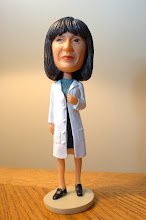 Welcome back! I hope everyone had a great Memorial Day weekend. This week's topic is a request, and is about diabetes and alcohol - can you, can't you, should you, etc. Well, like most things in life, there is no clear cut answer.
Welcome back! I hope everyone had a great Memorial Day weekend. This week's topic is a request, and is about diabetes and alcohol - can you, can't you, should you, etc. Well, like most things in life, there is no clear cut answer.I'll start with what alcohol's effect on the body. The thing about alcohol is (as many of you no doubt experienced over the holiday weekend) that it goes directly into the bloodstream without being metabolized in the stomach. In fact you can measure blood alcohol levels as quickly as 5 minutes after your first drink. Your liver now gets into the act of removing the alcohol from your blood (via the enzyme alcohol dehydrogenase) because it views alcohol as a poison. Because it looks at alcohol as a poison, it considers its removal its top priority, at the expense of other functions like sending out glucose. This means a potentially bad case of hypoglycemia (low blood sugar), and the effect can occur as long as 8-12 hours after you finish drinking. In addition, exercise and diabetes medications also work to lower blood sugar levels so all of this in combination can add up to a really bad time.
So, does that mean no alcohol for diabetics? Like I said initially, there isn't an easy answer to this one. First, make sure you talk to your doctor about your diabetes and its management; alcohol can also exacerbate high blood pressure and elevated triglycerides, which are common in diabetics. If your doctor doesn't object, you are otherwise healthy, your blood glucose levels are in check and you don't intend to get blitzed, you should be able to have a drink.
To avoid hypoglycemia, make sure you aren't drinking on an empty stomach, that your blood sugar levels are normal and eat something as you have your drink. Many of the symptoms of hypoglycemia are the same as drunkenness: sleepiness, dizziness, and disorientation. You don't want those around you to be confused about what is causing those symptoms because they need to be addressed differently!
Alcohol does contain "empty" calories at 7/g, so those need to be taken into consideration. Some alcohols are better choices than others due to the carbohydrate/sugar content. Low sugar options include: dry red or white wine, dry sherry, dry light beers (lagers or ales), and spirits (vodka, gin, whisky, etc) with diet mixers. High sugar options should be avoided as much as possible: sweet red or white wines (including dessert, port, sherries), heavy or dark beers (stout, porter), wine coolers/malt beverages, spirits with regular mixers, cocktails, liqueurs, and undiluted spirits.
I hope this helps those of you who are dealing with diabetes to feel more comfortable about alcohol and your diet. Enjoy your week and I'll be back!






No comments:
Post a Comment